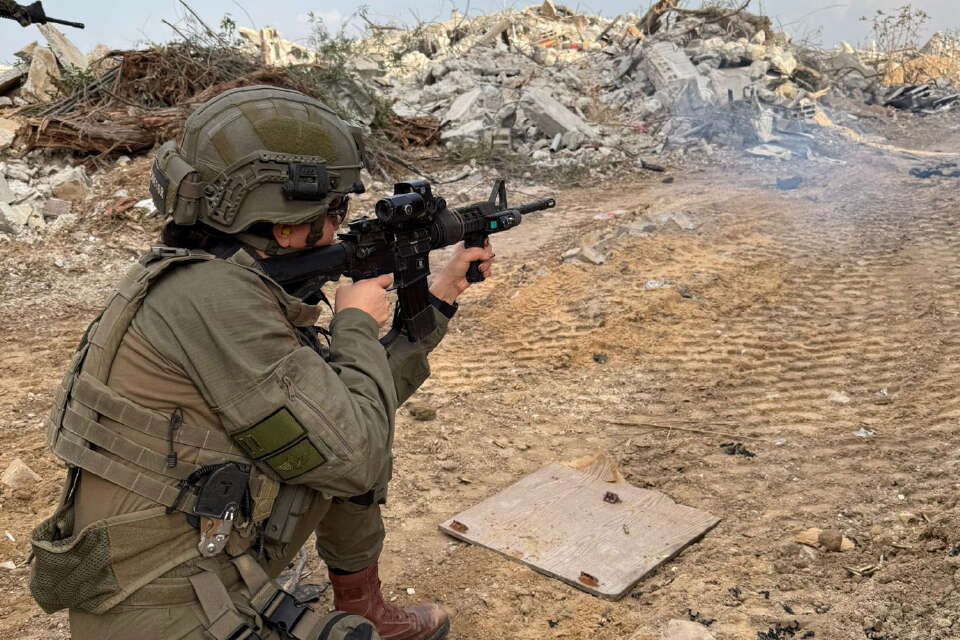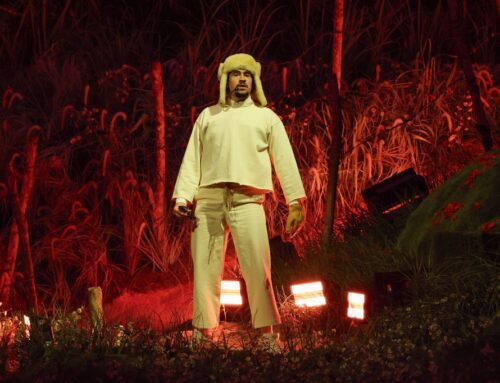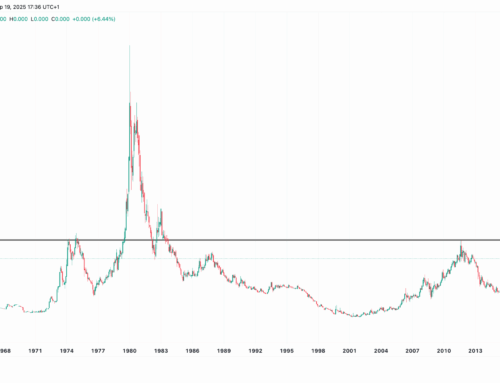The women fighting terrorists and stereotypes: ‘The male environment can be a bit caveman-
September 21, 2025
For Lt. S., an outstanding ballet dancer, a contract was waiting with a dance company in Barcelona. All she had to do was fly over and sign. On the other side stood a draft notice to the IDF, with an option to join the Technological and Maintenance Corps, the new and upgraded name of the former Ordnance Corps. What would you choose, the oil stains and smell of diesel, or a European tour in front of crowds and applause?
Recently I met S. (23) without her ballet shoes, wearing dusty army boots and grease-marked fatigues, proof that she had swapped out a Namer engine earlier that morning. The gifted dancer is a platoon commander in TnA with the Givati Reconnaissance Unit.
“The decision was hard, because dance was a great love,” she says. “I danced from age three and started flying to competitions at ten, but I told myself that if I am part of this country, there is no way I am not enlisting. I grew up on my parents’ stories and my grandfather’s stories from a mortar unit on the Suez Canal. Dance is a career, but from ninth grade I decided I would serve, and field work attracted me in particular.”
Until a few years ago, the very idea of a woman in combat roles was hard to swallow in certain quarters. Even Finance Minister Bezalel Smotrich, who also serves as a minister in the Defense Ministry, said on one occasion, “The army’s role is to fight and win, not to promote feminist beliefs.”
But the Swords of Iron war shattered outdated stereotypes and proved that female combat soldiers can eliminate terrorists, can survive captivity, and are capable of commanding a company, regardless of gender.
Aiming for the edge
In 2025, light years from the social attitudes that allowed the publication of songs steeped in chauvinism, we met four women from elite units who say gender simply is not part of the equation: Lt. S. from Givati Reconnaissance; Lt. K., who serves alongside her in the unit as a fire support officer; Lt. Dr. A., the medical officer of the Nahal Reconnaissance Unit; and Maj. N., the operations officer of the Haruv Reconnaissance Unit.
“Once, a senior figure in the country said that on the day there are female pilots he would grow hair on his palms,” begins Maj. N. (25). “Back then the idea that a woman could carry a stretcher or run with a weapon shouting ‘Forward, assault!’ was unthinkable. Everyone was horrified by the thought of a woman falling into captivity. But today we are all horrified by the thought of men in captivity. As long as my life is worth the same as a man’s, there is no dilemma about being a combat soldier and crossing enemy lines.”

Lt. Dr. A. (26), medical officer of the Nahal Reconnaissance Unit: “Staff Sgt. Agam Naim, of blessed memory, who served as a paramedic, fell during the war, and it was just as shocking as when a man falls. You cannot treat it differently, because in my eyes that cheapens men’s lives.”
Dr. A. began medical studies in 2016. She says that from age 17 she dreamed of being a combat physician and knew she would sign on for career service. She just did not plan on her service coinciding with Israel’s longest war.
“I have practiced karate since age four, so the world of combat is not foreign to me,” she laughs. “In the end you ask, where can I realize my potential, and the war clarified the need for all of us. If I had hesitated about the quality of life I wanted in the army, the war sharpened my desire to go to the limit. After their studies, academic-track officers are placed in roles, and I knew I wanted to reach a recon unit.”
The tree-climbing middle sister
Lt. K. (22), a fire support officer in Givati Reconnaissance, grew up in a military home and already in high school her path was clear. “I always wanted combat,” she recalls. “I am the middle of three sisters, the problematic one who climbed trees from a young age. I did a pre-military fitness program in high school and passed the Naval Officers’ screening, but I never expected to serve in a maneuvering battalion during a war.”
Maj. N., operations officer in the Haruv Reconnaissance Unit, initially thought about serving in the Education Corps and working with at-risk youth, until she realized that education can always be done, but defending the country is an opportunity offered for a limited time.
“I enlisted in the Caracal Battalion, served there as a squad commanders’ instructor and later as a company commander,” she says. “Then I got a call from the Haruv commander who asked me to interview to be his operations officer. I was sure he was messing with me, that someone was recording ‘haha, very funny.’ Turned out he was serious, and when I arrived I encountered lots of raised eyebrows, because people did not believe it. Today it is different.
“Anyone who does not understand the value a woman brings to the battlefield has never been in combat alongside a woman. I thought it would be harder to convince people that someone 1.60 meters tall saying on the radio where to go really means it. I was glad to discover how much we are measured by professionalism, not by the fact that we are women.”
They entered units traditionally considered very masculine, with familiar macho codes. Lt. S., a TnA platoon commander in Givati Reconnaissance: “At first I felt I had to fight for my professional opinion. After all, I am in a field that, to put it mildly, is not very feminine, spending all day with hands covered in grease and oil. Or I would declare a vehicle non-operational, explain the rationale, and get the response, ‘What are you talking about?’
“I always felt obliged to study extra, to ask the NCOs about every bolt and screw. Then came a conversation with the battalion commander who told me, ‘Don’t worry, I see you as a professional.’ From that moment I relaxed.”

Lt. Dr. A.: “Right after I took the job our unit ran battle procedures for an operation that began a week later. A reservist I had just met called the doctor I replaced and said about me, ‘She seems sweet, but what does she have to do with this?’ He had not grasped that they had brought in a woman physician, but for the unit commander this was not an issue. Maybe at first there were concerns I would lag behind, but once they see there is someone to rely on, that disappears.
“During service there is a stage called a ‘baptism by fire,’ an attachment to a place that is not your original assignment. I did mine with the Paratroopers Reconnaissance Unit. I went in with them for two weeks of fighting in al-Khiam in Lebanon, 11 kilometers from the border. They spoke about it as ‘the hardest thing.’ I thought to myself, if so, how is this my first maneuver, and on foot, with a 30-kilo pack on my back? But you go and do it without overthinking. I was more occupied with whether the readiness kit worked and whether the equipment was complete than with the significance of my being a woman there.”
“Mom would prefer something else”
Lt. S. arrived at Givati Reconnaissance less than a year ago. Before that she served in the Egoz Reconnaissance Unit. There she was not allowed to enter Gaza and was assigned to shifts in the war room. Only when she moved to Battalion 931 of the Nahal Brigade, a stop before Recon, did she feel what it means to cross the border.
“It came as a surprise,” she recalls. “At midnight the maintenance chief came over and asked me, ‘Have you been in Gaza?’ I said no. He said, ‘Good luck, you are going in tomorrow at 7 a.m.’ I deliberately chose 931 because I wanted more field time, to help from the inside.”
How did your family react?
“I come from a Polish family. Grandma worries, so she only hears things after the fact, not in real time. My mom has accepted it, and we have an agreement that every time I go into Gaza I text ‘entered,’ and every time I come out I text ‘exited.’ That way my parents can be calmer. They understood that I am in a role like any combat soldier.”
Maj. N.: “At first I didn’t tell my parents I had gone into Gaza, and I dodged with lines like ‘we are on leave lockdown, I am very busy.’ My mom would have preferred I serve in Education Corps, but for me serving as a combat soldier was not a dilemma, and at worst the family can drink a glass of water and relax.”
As combat soldiers, you have surely faced complex situations.
Maj. N.: “During Operation Iron Wall, entering Jenin after two relatively quiet weeks, there was an incident in which Staff Sgt. Liam Hazi, of blessed memory, was killed. Two terrorists fired on a team that had opened a search in a house. The complexity in Judea and Samaria is in many ways twice as hard as elsewhere, because you cannot just roam a neighborhood with heavy fire and call in artillery. Chasing terrorists and calling in airstrikes is a complex event, certainly as an operations officer who manages, coordinates and links forces.”
Lt. K.: “Our force from the Rotem Battalion hit IEDs 50 meters from our fortified position. Three soldiers were killed and there were wounded. We gave a rapid response, and the fire mission was based on my actions. It went on for two hours, hundreds of shells, because we feared terrorists would emerge from tunnels and hit the evacuation forces.

“The adrenaline is insane, because you know you are creating a ring of fire around our forces and keeping the enemy from approaching them. You have to be sharp and precise, because if you get the grid wrong you could drop a shell in the middle of our position, which could cost our troops killed and wounded.”
Lt. S.: “There was a case where combat soldiers came up on the radio and said that in the Namer they were riding, the gears were gone, it only moved forward and backward. Then you find yourself between houses, in an area nobody has been in yet, reassembling the gear linkage, otherwise the Namer will not move. It is intimidating, because you hear shooting and explosions all around. You see vehicles speeding by and it spikes your adrenaline, because the moment you fix it and the vehicle returns to service, you know we are the ones who made that possible.”
Do you feel fluent in mechanics?
“Not a pro yet, but I try to stick close to the professionals. Today, for example, I detached two engines. See, there is still a bit of black paint on my forearms. My parents still cannot process it.”
“Of course there are differences compared to the men”
Lt. S.: “Of course there are physiological differences between women and men. I can carry less weight, and Namer spare parts are heavy, about my size. The NCOs are aware and support me, because they know I came to work. Today, when I opened an engine, the crane operator stared in shock, asked to photograph me and send it to friends. A mechanic working, with sky-blue gel polish on her nails. I got the NCOs used to this: you assign tasks, ‘open this bolt,’ ‘close with the drill,’ and I do it. I can heft a pry bar and disconnect a U-joint to tow a Namer out. Heavy? Heavy.”
Maj. N.: “You should have seen me with a large rucksack, carrying the dismembered body of a terrorist on a stretcher while shots were being fired around. Changing perceptions in the army does not take a day. Would anyone once have imagined a circle of female officers talking about maneuver experiences in Gaza? They would have said we were crazy.”
There are still those who argue that women are “more sensitive” compared to male combat soldier.
Maj. N.: “Mixing men and women is excellent. I maneuvered with the 74th Armored Battalion. I stepped into the battalion commander’s house and met a female fire support officer, a female intelligence officer, a female combat communications officer, and a woman doctor. All in Gaza, in the middle of a fortified compound. The emotional and cognitive differences we bring create a whole that is many times more powerful. I will allow myself to say that the male environment can sometimes be macho and ‘caveman-like,’ and placing a woman among them often balances and provides a counterweight. The perspective changes.”
Lt. K.: “You live with men 24/7, and I find myself brushing my teeth with the battalion commander next to me. In the middle of an attack I have said to the radioman, ‘Hold here, I am going to pee.’ The differences are less noticeable because you live together.”
Lt. A.: “Life in a recon unit taught me that men are much more sensitive than many women I know.”
As combat soldiers, you surely hear the world’s claims about “indiscriminate killing” in Gaza.
Maj. N.: “People do not know how moral the IDF is, and what process targets must go through to be approved. The army will not budge an inch from the permissible level of collateral damage under international law regarding harm to noncombatants. An example: we were in the middle of an assault and suddenly saw a woman. Force protection is paramount, but gradually, through escalation of force, we managed to move her to the humanitarian area. I was so proud to be part of that.”
Lt. K.: “In the fires world there is constant attention to the percentage of civilian evacuations and to sensitive sites like hospitals, schools and clinics, where we nevertheless find booby traps and terrorist infrastructure. With us, everything is done surgically and accompanied by approvals from a division commander and a major general. Maximum precision.”

Lt. A.: “We encounter this all the time, and the law is the law. In the end you do not consider who the person in front of you is. You have to provide the best care possible with the means and constraints you have.”
“Being strong for myself”
Lt. Dr. A., the doctor in Nahal Reconnaissance, encountered harsh sights in the war already in her first days in the role. “I was an intern, so I experienced it from the side that receives the wounded in the hospital, and that is even harder,” she recalls.
“On the battlefield you think only about functioning, you do not really process the emotional meaning of the event, where I focus only on evacuating and running from casualty to casualty. In the first month on the job we were in Beit Hanoun with the unit, and there was a mass-casualty incident with five dead and 11 wounded. I dismounted, heard explosions, and it felt unnatural to walk around like that, but you have to operate. I am a cool-headed person, and that is my advantage.”
You have all faced the realities of war.
Lt. S.: “When I was with Nahal in the Zaytoun neighborhood, a platoon commander who was in my high school class was badly wounded. You hear it on the radio and have to shut off emotion to stay cool-headed in making decisions. The only thing going through your mind is that if I am not strong enough, no one will do it in my place.”
Maj. N.: “Two weeks before he fell, I sent Staff Sgt. Liam Hazi, of blessed memory, on a mission, and he excelled. When he was killed, and we returned that night to the battalion commander’s house, I said it was terrible. War can be interesting and exhilarating, but in the end it takes the lives of so many young people. It is sad. The price is unbearable, and we understand its weight and know how to carry on.”
Has something in your character changed during service?
Lt. A.: “I have dealt with situations I would never face anywhere else. Two weeks ago a soldier with a catastrophic head injury returned to the unit. Seeing him walking was a feeling unlike anything else. The challenge is great, but the payoff is huge. It draws out traits you did not know you had and puts things in proportion. In the end you function coolly in situations that could deeply unsettle others.”
Lt. S.: “Command moves me. Commanding a platoon, with married soldiers with kids on one side and, on the other, young troops straight out of high school now fixing weapons, and I treat them like an older sister, like a mother. I have their backs. It is funny, because some of the NCOs are my parents’ age. As hard as the war is, and we are all tired, it opened the door to many new things.”
Lt. K.: “Our generation has experienced things that people two decades older did not. It matures and toughens you. From the small things, like sleeping two hours a night, not showering for a month and not going home, to operational events where you meet death up close. It feels like October 7 happened a second and a half ago. Our generation is built stronger now.”
Maj. N.: “It put into proportion what you have to protect, and how blessed the quiet routine is when all your loved ones are with you. My understanding of the importance of the army and the defense establishment also changed. Knowing it is necessary and you cannot run from it. In my view this change will open more paths for women in the military. Screening should be professional and not gender-based. I am not asking to lower the bar, but I do aspire to a situation where I can tell 16-year-old girls, ‘If you meet the physical standards, you are in.'”

There is now strong demand to recruit female combat soldiers.
Maj. N.: “We are back to the days of the War of Independence, to an existential war. The State of Israel will endure, but we see what is happening in the world and understand that this is our home and that it is a privilege to enlist and serve as combat soldiers. Israeli women are tough. We had women combat soldiers even before the state was founded, from Hannah Szenes to Esther Arditi. It is in our blood.”
At no stage did you have doubts like, “Why do I need this?”
Lt. S.: “More than once I stand on a Namer and think that I could just as easily be walking on the beach in Barcelona after a ballet class. But then I remember the best times in the army and know I would not trade the path. It is the best decision I made, which is why I extended my service. I could not imagine hearing about an operation in Gaza while I was sunbathing in Thailand.”
Lt. K.: “The thought crossed my mind when I did not see my boyfriend for two months, or now, when my sister is getting married and I do not know when I will get out for the wedding. After a month without a shower you cannot say you are enjoying yourself, but it is worth it, because this is why I enlisted in combat. I wanted to give because I knew I could. It is the role I dreamed of.”
Maj. N.: “What is a woman? To be strong, to do everything to succeed and meet the mission. Whoever thinks otherwise is a bit confused.”
Maj. N. is on track for a military career. She recently completed her position in the recon unit and will serve as deputy commander of the mixed infantry battalion Lavi HaBik’a. “I want to be a mother and start a family, and there is no doubt it is a demanding and complex balance,” she says, “but the army does a lot to make it possible, and there are many examples. It is hard, but it is also hard to be a father who is an officer.”
One could joke that many officers would prefer Gaza over changing diapers at home.
Maj. N.: “That is why they say women are multitaskers.”
Looking ahead, how do you see your future in the army?
Lt. K.: “My role is meaningful, and I still have time in service, but later I want to study medicine.”
Lt. S.: “My enlistment dispelled outdated stigmas. TnA is one of the most amazing corps, and you feel it in wartime. But I have a dream to study law and international relations. For now I am considering maybe staying another year.”
Lt. A.: “I would not have chosen this track if I did not aspire to be a doctor in civilian life, specifically a neurosurgeon. I do not know how long I will stay in the army, but in the end I will do what excited me from the start.”
“Only at the end did I realize I was capable”
Before we parted, I asked the four combat soldiers to share a special moment they will carry with them from the war.
Lt. K.: “I think about the first time I ended up in a firefight, two days after I started my role in the recon unit. An anti-tank missile was fired at us. I panicked, because I did not have all my gear on me, and the communications with the artillery battery were tenuous, yet I still functioned. When the incident ended I realized I could handle it, and from there it just flowed.”

Lt. A.: “There was a gravely wounded soldier in the field, and we did everything possible to save him, from opening an airway to giving a blood transfusion. He was in bad shape, sedated and ventilated. Later I went to visit the wounded in rehab, and because I heard that his family was there and frustrated by his condition, I hesitated to approach. I told myself it might be too soon. Only after some time did I meet his mother, and she hugged me and thanked me. A weight lifted off my heart.”
Lt. S.: “After the stint with Nahal I thought I would be discharged, and I said that if I continue, it would only be in a role that gives me butterflies. Positions opened, including Givati Reconnaissance, and I went for it with everything. I told the TnA officer in the brigade, ‘Recon or discharge.’ I knew that if I did not get the recon unit, my heart would break.
“One day I was with the APC inspector in the middle of maintenance, and suddenly I got a call from an unknown number. It was the Givati Reconnaissance battalion commander calling to wish me congratulations. From joy I tossed the wrench in the air. I knew this was where I was meant to be.”
Maj. N.: “I went home and sat in a café in central Tel Aviv, wearing tactical fatigues and my weapon. Suddenly two girls came up, saw the rank and the Haruv Recon patch, and said it was amazing and that they wanted to serve like that too. Before they left they said to me, ‘Thank you for protecting us.’ A small sentence, but one that strengthens your motivation to get up in the morning and keep working even after 30 grueling days in Gaza.”
Tags: IDF
Search
RECENT PRESS RELEASES
Related Post




